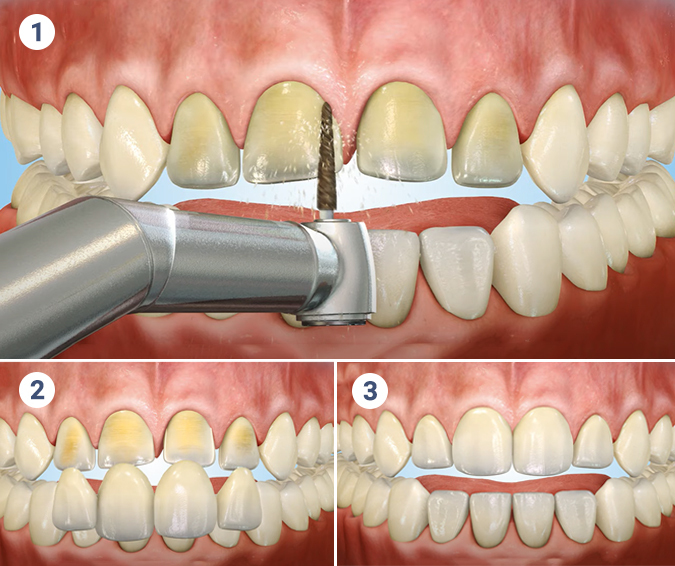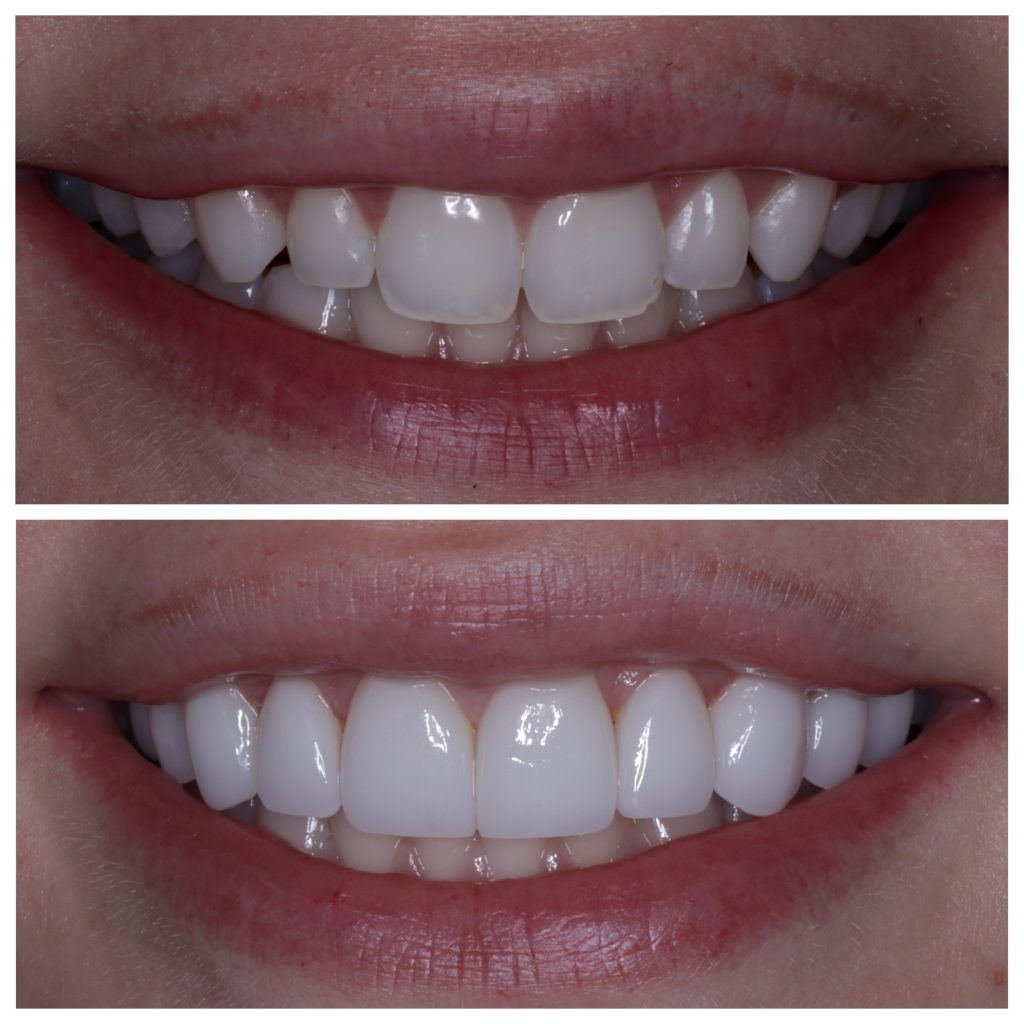The Full Overview of Veneers: Kinds, Utilizes, and Their Influence on Your Smile
Veneers work as a popular service for people looking for to improve their oral appearances. These custom-crafted shells can effectively mask flaws such as staining and spaces. With 2 main types offered, porcelain and composite material, each offers unique advantages and restrictions. The influence of veneers expands past mere appearance, affecting self-esteem and social interactions. Comprehending their kinds and benefits is crucial. What might this mean for one's general top quality of life?
Understanding Veneers: What They Are and How They Work
Veneers are thin coverings, typically made from porcelain or composite resin, that are custom-crafted to fit over the front surface of teeth. They serve both useful and visual purposes, providing a service for various oral blemishes such as staining, gaps, and minor misalignments. By adhering to the tooth enamel, veneers produce an all-natural appearance while improving the shape and color of the teeth.
The process usually includes a preliminary examination, where a dental practitioner analyzes the person's needs and talks about wanted end results - Porcelain Veneers. Following this, a marginal quantity of enamel might be eliminated to accommodate the veneer. Perceptions of the teeth are then taken to ensure a specific fit. As soon as made, the veneers are bonded firmly to the teeth utilizing a special oral adhesive. This treatment not just enhances the smile's appearance but likewise helps shield the underlying teeth from more damages, making veneers a preferred choice for several looking for a smile remodeling
Kinds of Veneers: Porcelain vs. Composite Resin
The difference in between porcelain and composite resin veneers lies in their product structure and features. Each type uses varying levels of expense, longevity, and durability, influencing individuals' choices based upon their individual requirements. Recognizing these differences is vital for making a notified decision relating to dental enhancements.
Material Differences Discussed
While both porcelain and composite material veneers serve the exact same cosmetic objective, they vary significantly in product residential or commercial properties, toughness, and visual results. Porcelain veneers are crafted from a ceramic product that simulates the all-natural translucence of teeth, offering a realistic appearance. Their smooth surface area is immune to discoloration, making them an attractive alternative for those looking for a long-lasting aesthetic. On the other hand, composite material veneers are made from a tooth-colored plastic product, using convenience and convenience of application. However, they might not achieve the same level of brightness or translucency as porcelain. Additionally, composite veneers can be much more quickly formed and repaired, making them an extra adaptable option in specific dental scenarios. Each type presents unique benefits tailored to private choices.
Long life and Longevity
Longevity and durability are significant variables when comparing porcelain and composite resin veneers. Porcelain veneers are known for their toughness, frequently long-term 10 to 15 years with correct treatment. Their strength versus discoloring and cracking makes them a favored selection for individuals looking for long-lasting outcomes. On the other hand, composite material veneers typically have a shorter life-span, balancing 5 to 7 years. While they can be repaired a lot more conveniently if harmed, they are extra prone to use and staining over time. The choice between these products frequently depends upon the person's lifestyle, aesthetic objectives, and upkeep choices. Inevitably, recognizing the distinctions in longevity and longevity can direct people in picking the veneer type that best fits their requirements.
Cost Contrast Insights
When selecting in between porcelain and composite resin veneers, price is an essential factor to consider. Porcelain veneers generally vary from $800 to $2,500 per tooth, reflecting their sturdiness, visual appeal, and resistance to staining. These veneers require a much more considerable procedure and specialized laboratory job, adding to their greater price. In comparison, composite resin veneers are normally extra budget friendly, costing in between $250 and $1,500 per tooth. They can be used in a single visit, which decreases labor expenses. Composite veneers might need much more regular replacements, possibly raising lasting costs. Inevitably, the selection between porcelain and composite resin veneers depends on individual budget plans and desired results, balancing initial prices versus long life and visual results.
The Benefits of Picking Veneers for Your Smile
Picking veneers supplies substantial advantages for those looking for an improved smile. Their boosted aesthetic appeal can transform the look of teeth, while their stain-resistant properties guarantee a long lasting illumination - What Are Veneers. This combination makes veneers a popular alternative for individuals looking to attain a perfect smile
Enhanced Visual Charm
When people seek to improve their smiles, veneers commonly become a favored solution as a result of their transformative aesthetic advantages. These slim shells, typically constructed from porcelain or composite material, can efficiently hide imperfections such as chips, gaps, and misalignment. By imitating the natural look of teeth, veneers offer a smooth, glowing smile. Their customizable nature permits a customized technique, allowing individuals to choose tones and forms that finest fit their face attributes. Furthermore, veneers can develop an uniform appearance, boosting total face symmetry. This aesthetic enhancement not only improves confidence however can also favorably affect social communications and individual partnerships, making veneers a popular selection for those wanting to accomplish a brighter, a lot more eye-catching smile.
Stain Resistance Perks
Veneers not just boost visual charm however additionally offer substantial discolor resistance, making them an attractive alternative for individuals concerned concerning maintaining a bright smile. Made up of long lasting materials such as porcelain or composite resin, veneers are less permeable than all-natural teeth, which helps stop the absorption of discolorations from usual culprits like coffee, tea, and red white wine. This inherent discolor resistance allows people to enjoy their favored drinks without bothering with staining. What Are Veneers. Additionally, the smooth surface of veneers makes them less complicated to tidy, more boosting their long life and maintaining their pristine look. Therefore, veneers offer a functional service for those seeking both beauty and functionality in their dental treatment
The Refine of Getting Veneers: What to Anticipate

The process of getting veneers might seem intimidating, understanding the steps included can ease worries. A consultation with a dentist is necessary to establish if veneers are the proper service for the individual's oral issues. Throughout this visit, the dental professional will certainly review wanted results and take impressions of the teeth.
Next off, a second visit is scheduled for tooth prep work, where a percentage of enamel is commonly eliminated to accommodate the veneers. Momentary veneers may be positioned while the custom ones are crafted in an oral lab, which typically takes a pair of weeks.
Once prepared, the dentist will certainly place the veneers, making certain proper fit and shade prior to bonding them to the teeth utilizing an unique adhesive. After final changes, the dental practitioner will give guidance on treatment. Recognizing these steps can assist people feel a lot more comfy and informed throughout the veneer procedure.
Upkeep and Take Care Of Your Veneers
Preserving veneers needs consistent care to ensure their longevity and appearance. Proper dental health is important; cleaning two times daily with a non-abrasive tooth paste and flossing on a regular basis aid protect against plaque buildup around the veneers. Furthermore, regular dental examinations are essential for monitoring the problem of the veneers and attending to any kind of potential concerns at an early stage.
When biting to protect against damages, clients should avoid difficult foods and too much pressure. It's likewise a good idea to limit consumption of tarnishing compounds, such as coffee, tea, and merlot, as these can influence the veneers' shade over time.

Transforming Your Smile: Real-Life Effect of Veneers
A radiant smile can considerably boost one's confidence and overall appearance. For numerous individuals, veneers work as a transformative solution, efficiently dealing with various dental concerns such as discoloration, voids, and imbalance. These slim coverings, tailor-made to fit over the front of the teeth, can create a harmonious and cosmetically pleasing smile.
Real-life instances highlight the profound effect veneers can have. People usually report a prompt boost in self-confidence and social interactions following their treatment. The newly found self-confidence can lead to more opportunities in personal and professional life, as people feel even more inclined to engage and share themselves.
In addition, the mental benefits extend past plain look; numerous experience enhanced mental health as they embrace their smiles. Veneers not just enhance physical attributes yet likewise contribute significantly to overall top quality of life, highlighting their value in cosmetic dental care.
Often Asked Questions
For How Long Do Veneers Generally Last Prior To Requiring Substitute?
Veneers generally last in between 10 to 15 years before requiring substitute. Variables such as oral health, dental behaviors, and the sort of material made use of can influence their longevity and general toughness. Routine oral exams are a good idea.
Can Veneers Be Removed, and if So, Just how?
Yes, veneers can be removed. official site A dental professional generally uses customized tools to carefully separate them from the teeth, making certain marginal damage to the underlying enamel, frequently followed by required modifications or restorations for suitable aesthetics.
Are Veneers Suitable for Every person's Dental Condition?

Will Obtaining Veneers Pain or Require Anesthesia?
Getting veneers typically includes minimal discomfort, and several patients get local anesthetic to assure a pain-free experience. Sensitivity might take place temporarily afterward, yet most discover the procedure bearable and are pleased with the outcomes.
How Do Veneers Affect Tooth Sensitivity After Positioning?
Veneers can momentarily increase tooth sensitivity due to the elimination of enamel and the bonding process. A lot of individuals experience a reduction in sensitivity with time as the teeth get used to the brand-new veneers.
Veneers are slim shells, normally made from porcelain or composite resin, that are custom-crafted to fit over the front surface area of teeth. Porcelain veneers are crafted from a ceramic product that mimics the natural translucence of teeth, supplying a lifelike appearance. Porcelain veneers usually range from $800 to $2,500 per tooth, reflecting their longevity, aesthetic appeal, and Porcelain Veneers resistance to staining. In comparison, composite material veneers are usually more inexpensive, costing between $250 and $1,500 per tooth. Made up of durable materials such as porcelain or composite resin, veneers are much less permeable than all-natural teeth, which aids prevent the absorption of stains from typical perpetrators like coffee, tea, and red a glass of wine.